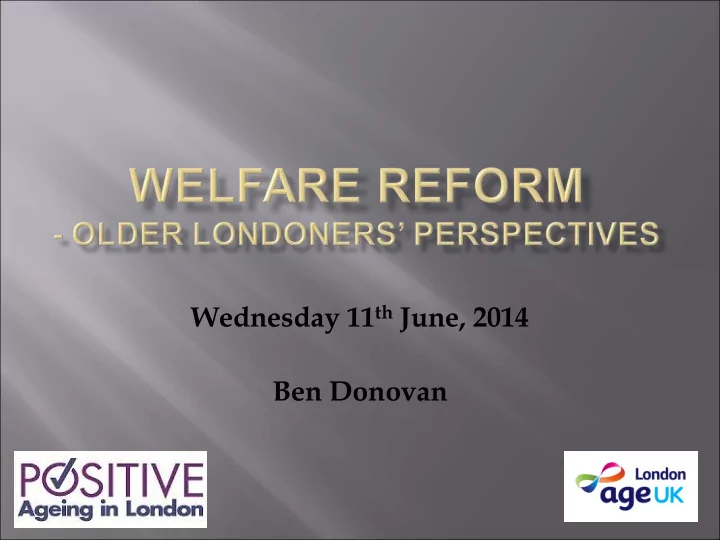

Wednesday 11 th June, 2014 Ben Donovan
� Research Background � Research Rationale � Our Approach � Example Case-Study 1 – Linda � Example Case-Study 2 – Tom � Where Next?
Main Changes: � Social Fund Scheme changed to Discretionary Crisis Fund � Housing Benefit and under-occupancy � Council Tax Benefit changed to Council Tax Support Scheme � DLA changed to PIP � Introduction of Benefit Cap � Introduction of Universal Credit
Context � Increasing utility prices � Research on OP poverty � Research on OP debt-management � Circumstances for job-seekers aged 50+
� Conducive with purposes of PAiL � Need to understand impacts on OP specifically � A shortage of ‘interacting effect’ research on OP � A shortage of case-studies with OP documented � Interest in ‘knock-on’ effects
� Lit. Review of changes and impact � Analysis of data from AUK ‘Information and Advice’ services � Analysis of data from ‘Your Priorities 2014’ � Interviews with organisations working with OP affected � Interviews with OP themselves
� 58 year-old woman � Lives alone in rented accommodation � Currently in receipt of – Housing Benefit – Council Tax Support – Job-Seekers Allowance � Made unemployed 10 years ago � Would like to work – currently volunteering
Financial changes since 2010 � 2010 – Mar’ 2012 – JSA and full Housing Benefit (inc. w/ inflation) � Apr’ 2012 – JSA inc. reduced to 1% � Apr’ 2013 – Band B contribution towards council tax (~ £11) � + more travel costs (JC) + inflation on necessary expenditure (food etc.)
Increased reliance on sister and Mother to 1. cover costs (usually transport) Doesn’t buy new clothes/Buys food ‘in bulk’ 2. and cooks meals in advance Fear of increased rent-costs and or a large 3. ‘one-off’ payment ‘Them’ against ‘me’ impression of JC 4. Lack of success in job-market has hit 5. confidence
Linda’s reported barriers to employment: 1. Changes in recruitment expectations 2. Possible bias against older applicants 3. Difficulties keeping up-to-date with changes in her line of work (e.g. technologies) 4. Mandatory job-centre training inappropriate 5. Lower salaries/part-time work not financially viable 6. Increasing period of time out of work
� 52 year-old man � Lives alone in housing association accommodation but has a two-bedroom flat � Has a moderate learning disability � Unemployed – unable to read � Has lived in the same area for many years
Key changes � Housing benefits had become subject to under- occupation penalties � Started receiving discretionary housing payments subject to regular reviews � Making positive efforts to resolve the shortfall was a requirement for the discretionary payments
Anxiety over having to move home 1. Feelings of being pressurised by postal 2. communications (that he can’t read) with listed properties Fear of eviction 3. Reportedly no one-bedroom properties in the 4. locality
2 key questions: 1. What individual scenarios can you think of where impact of welfare reform would be most keenly felt? 2. How can prospective participants experiencing these scenarios be most meaningfully contacted and engaged with?
Recommend
More recommend